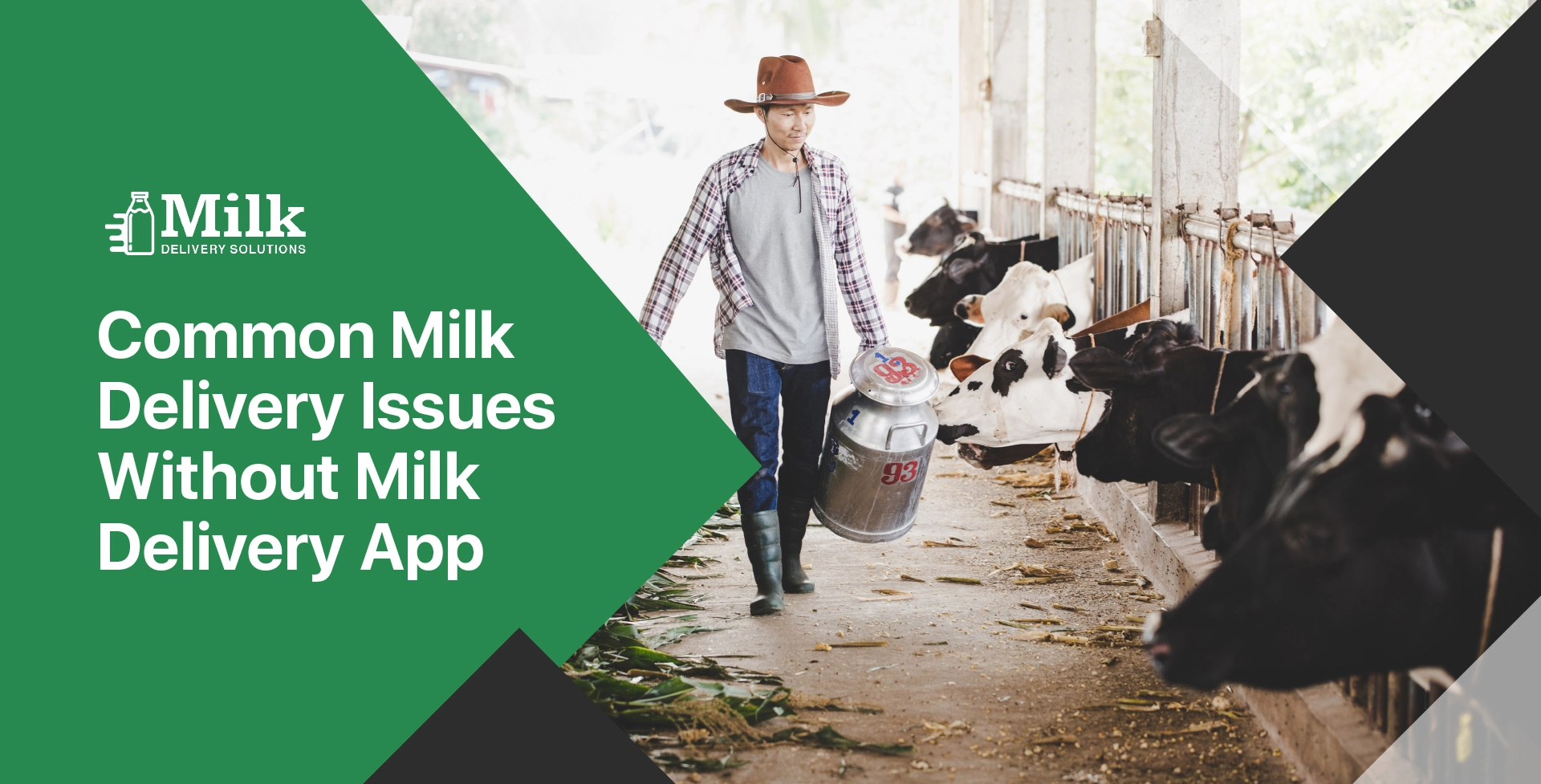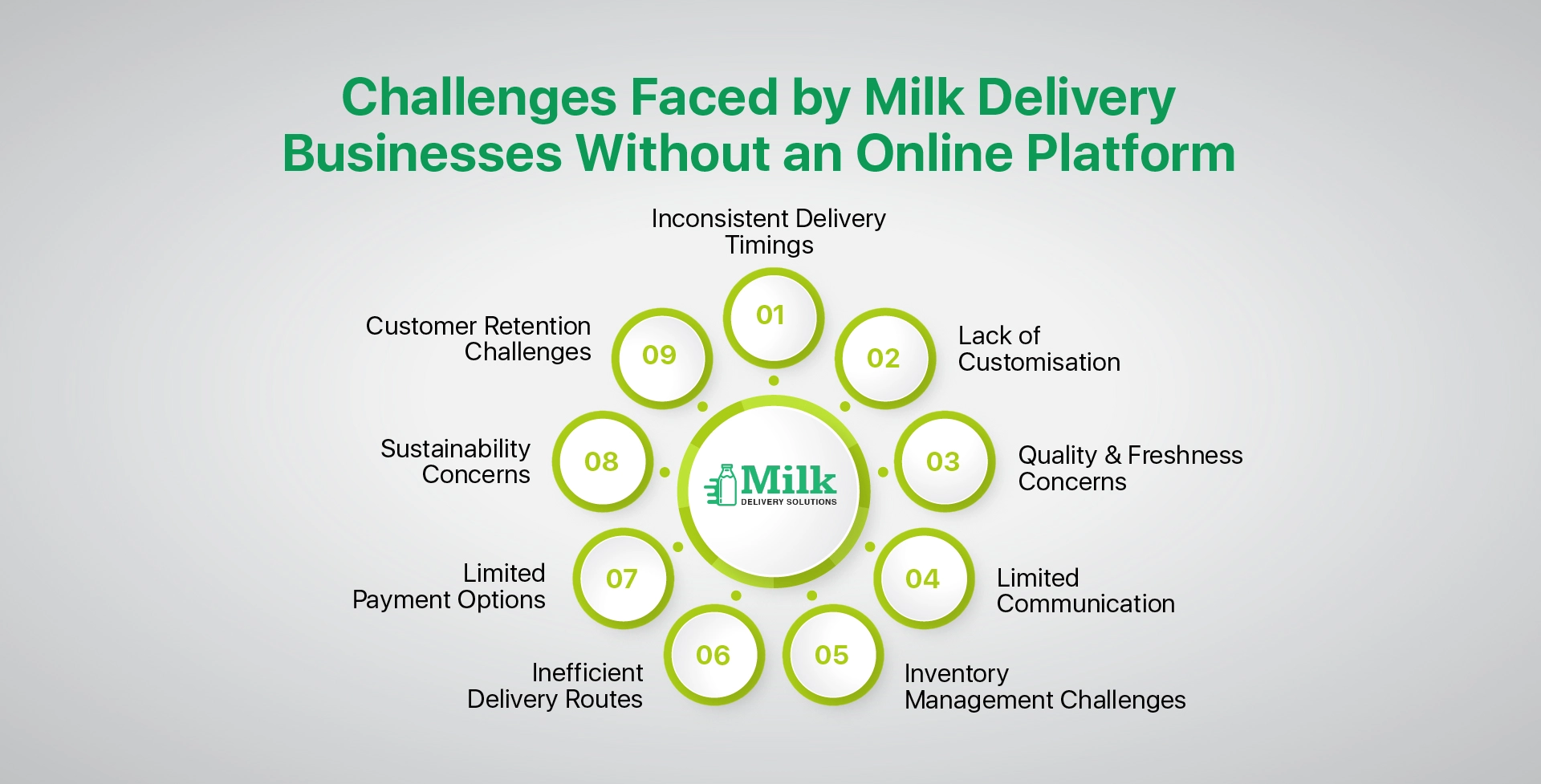Common Milk Delivery Issues Without Milk Delivery App
The importance of convenience in today’s fast-paced society extends to how we obtain necessities like milk. Milkmen used to regularly deliver fresh dairy goods to our doorsteps, making milk delivery a common occurrence. Without the help of modern technology and milk delivery apps, however, this traditional service frequently runs into a number of problems that have an impact on both customers and suppliers.
What is a Milk Delivery App?
The milk delivery app is an online platform provided to customers that allows them to place, modify, and track their orders. The customer app works in sync with the admin panel of the delivery software. Admins can see real-time changes made by customers on the app.
Challenges Faced by Milk Delivery Businesses without an Online Platform
Inconsistent Delivery Timings
Inconsistent delivery times are among the most prevalent issues with traditional milk delivery services. Customers frequently have to guess when their milk will arrive because there is no set schedule. The inconvenience can result from this uncertainty, particularly for households with hectic schedules.
There is no simple way to monitor the delivery’s progress or get real-time updates without a milk delivery app. Customers are made to wait, and if the delivery is late or never arrives, it may leave them feeling angry and disappointed.
Lack of customization
When it comes to dairy products, every customer has specific preferences. While some people may prefer whole milk, others may prefer skim or lactose-free options. A milk delivery business is not able to offer a wide range of milk products without a milk delivery app.
Customers who have particular dietary or taste requirements may find this lack of customization to be a major disadvantage. When customers are pressured into accepting goods that do not suit their preferences, it can also lead to needless waste.
Quality and freshness concerns
Consumers place a premium on the quality and freshness of milk. Traditional milk delivery services, however, frequently fall short in this area. Customers have little knowledge of how the milk they receive is sourced and handled.
Customers cannot easily confirm the quality and freshness of the product without a milk delivery app. This lack of knowledge can cause uncertainty and worries about the quality and safety of the milk, which can undermine confidence in the supplier.
Limited communication
It is crucial for customers and milk suppliers to communicate clearly in order to address issues, offer feedback, or make special requests. The communication process can be challenging without a dedicated platform, such as a milk delivery app. Customers might be forced to contact the milkman via phone or in person, which is not always practical or effective. Because of this, clients might be reluctant to offer suggestions or ask for order modifications.
Inventory management challenges
Without technology, inventory control is a common problem for milk suppliers. Making the proper milk production or stocking decisions can be difficult. Waste can result from overproduction, while supply shortages and dissatisfied customers can happen from underproduction.
In addition, suppliers might not have the resources to examine demand trends, which would make the production and delivery processes less efficient. Problems like irregular deliveries or product shortages may result from these inventory management difficulties.
Inefficient delivery routes
Traditional milk delivery services might not have the tools necessary to efficiently optimise delivery routes. Because of this, milkmen may take longer routes or experience traffic jams, resulting in erratic delivery times and higher operating costs.
Ineffective routes can have an adverse effect on the environment by increasing fuel consumption and carbon emissions. This not only affects the bottom line of the supplier but also raises concerns about sustainability.
Limited payment options
Cash transactions are commonly the norm in traditional milk delivery services. Customers who prefer using digital payment methods or who might not have easy access to cash may find this inconvenient. A payment dispute or error is also more likely as a result.
Without a milk delivery app, vendors might find it difficult to accept a wide range of payment methods, such as credit cards, mobile wallets, or online transfers, which would reduce the comfort and flexibility of customers.
Sustainability concerns
Traditional milk delivery services might not be consistent with modern environmental and sustainability values. Many of these services use single-use plastic containers to package milk, which adds to the plastic waste problem. Instead, glass bottles can be used.
Moreover, traditional services may have a larger carbon footprint than more effective alternatives because they lack the technological tools to optimise routes and operations.
Customer retention challenges
The cumulative effect of these issues could ultimately be detrimental to customer retention. Instead of using a milk delivery service that offers convenience, customization, transparency, and dependable service, customers may decide to purchase milk from supermarkets or online retailers.
Customer dissatisfaction may have an impact on the long-term viability of milk delivery services and may result in the dissolution of long-standing business relationships.
Traditional milk delivery services run into a number of problems that are pervasive and may affect both customers and suppliers. Inconsistent delivery schedules, a lack of customization options, worries about product quality and freshness, communication problems, issues with inventory management, inefficient delivery routes, a lack of payment options, concerns over sustainability, and issues with client retention are a few of these challenges.
By addressing many of these problems, milk delivery apps have completely changed the milk delivery industry. These apps improve customer satisfaction and retention by providing convenience, real-time tracking, personalisation, and transparent information about milk sourcing. It is obvious that the milk delivery landscape is changing as technology progresses, and those who adopt contemporary solutions are likely to prosper in this constantly shifting business.




